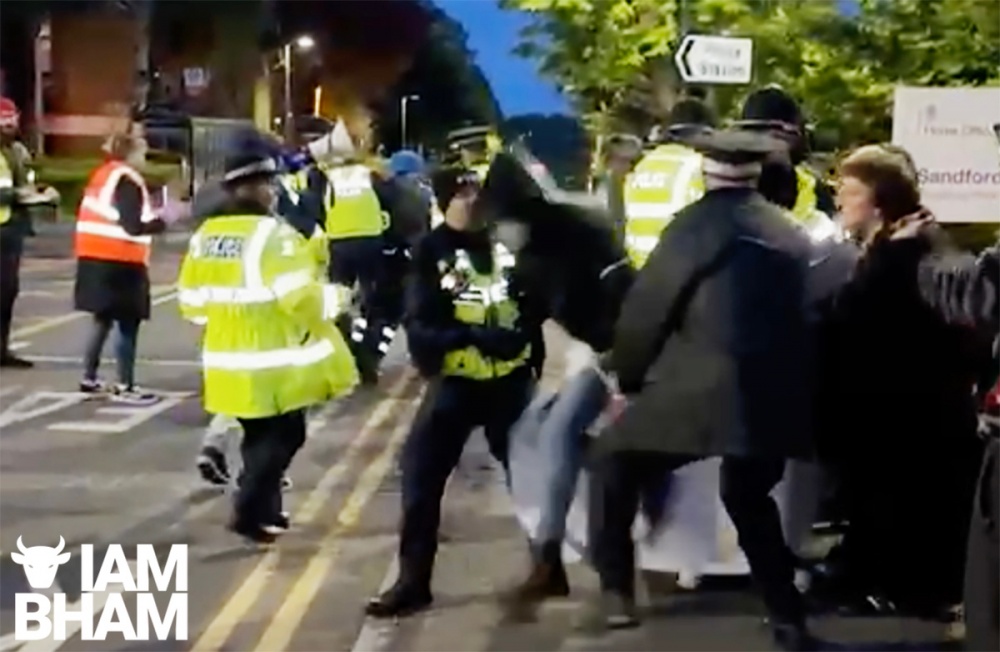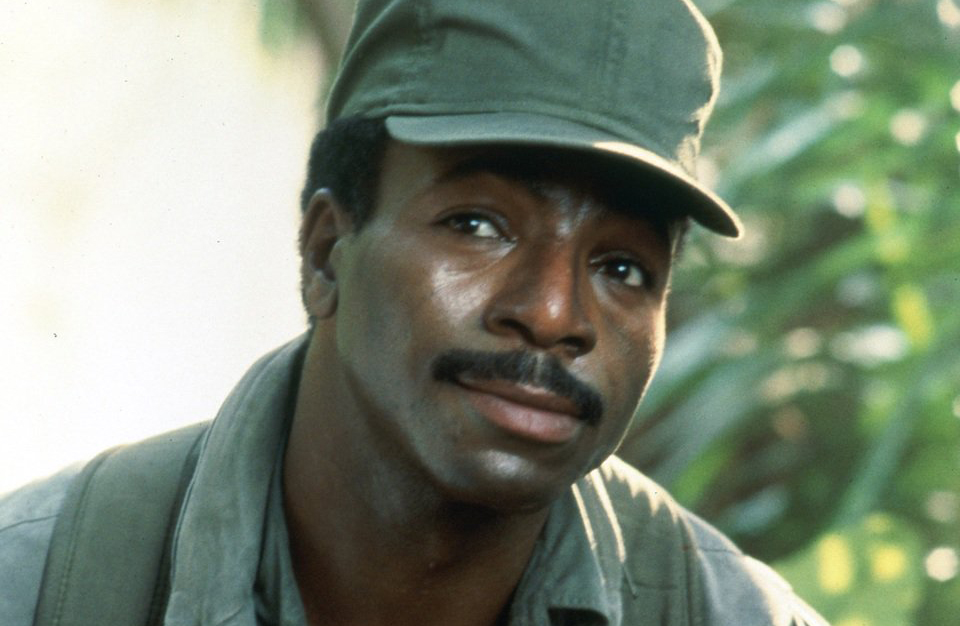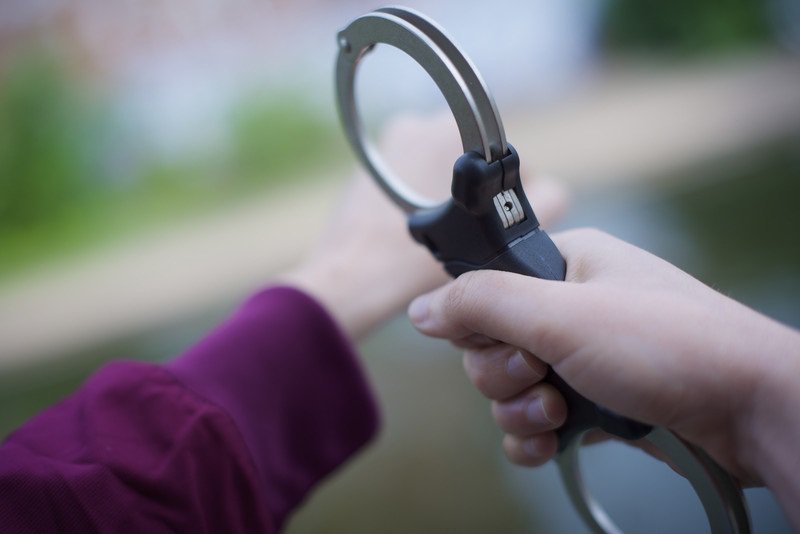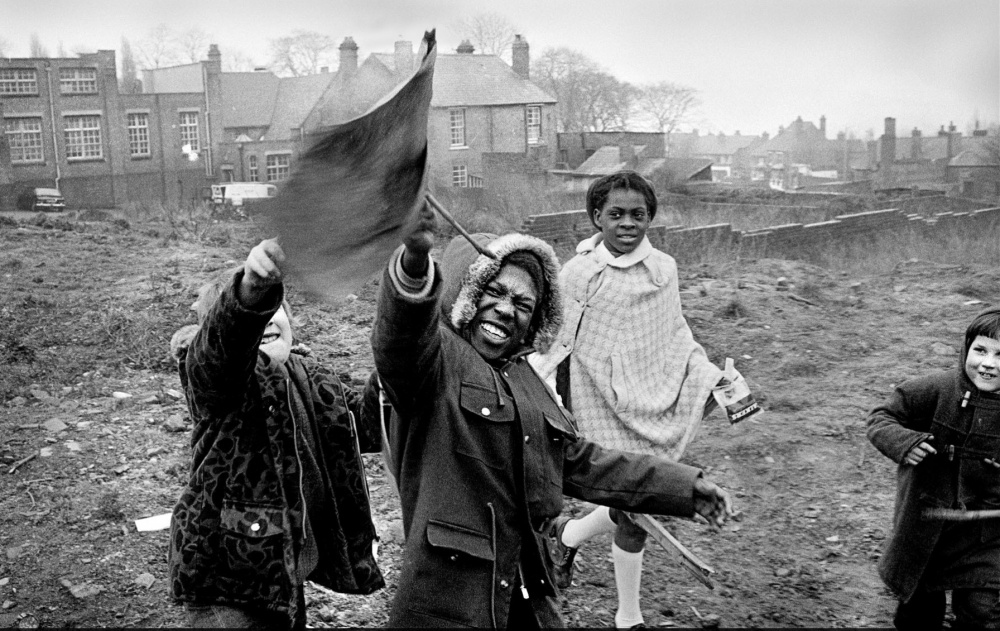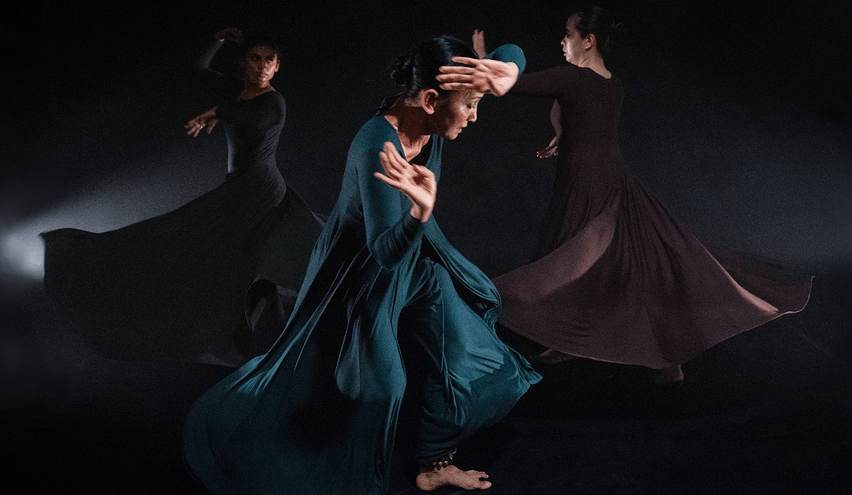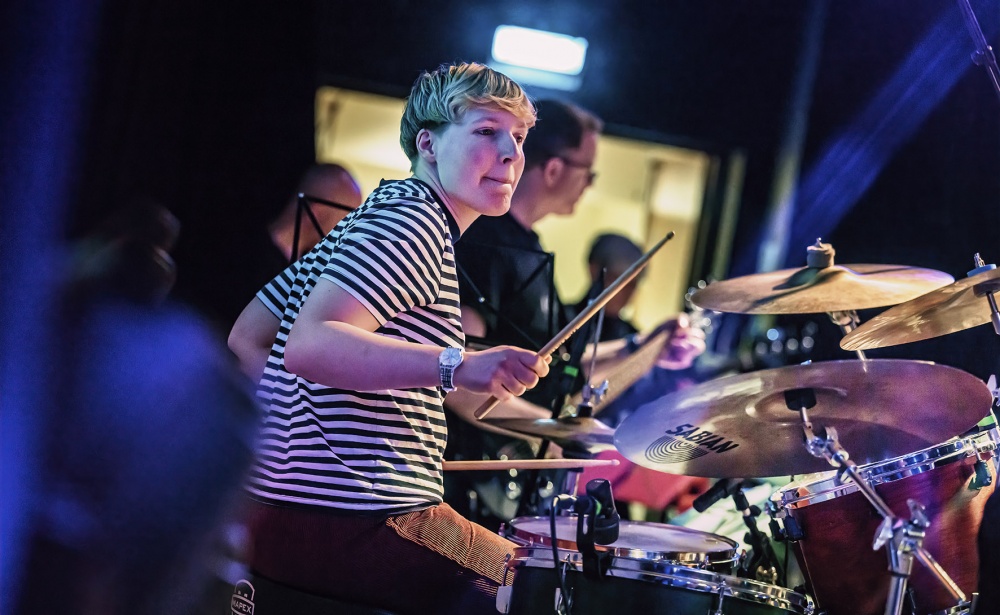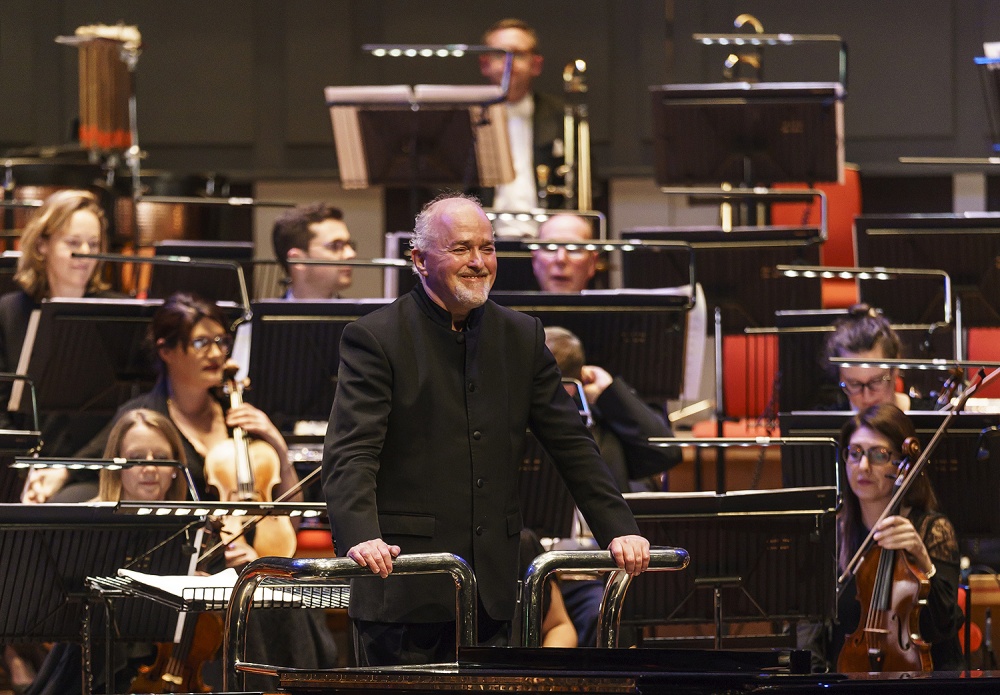REVIEW: The Power of the Dog deservedly scoops top BAFTA prize
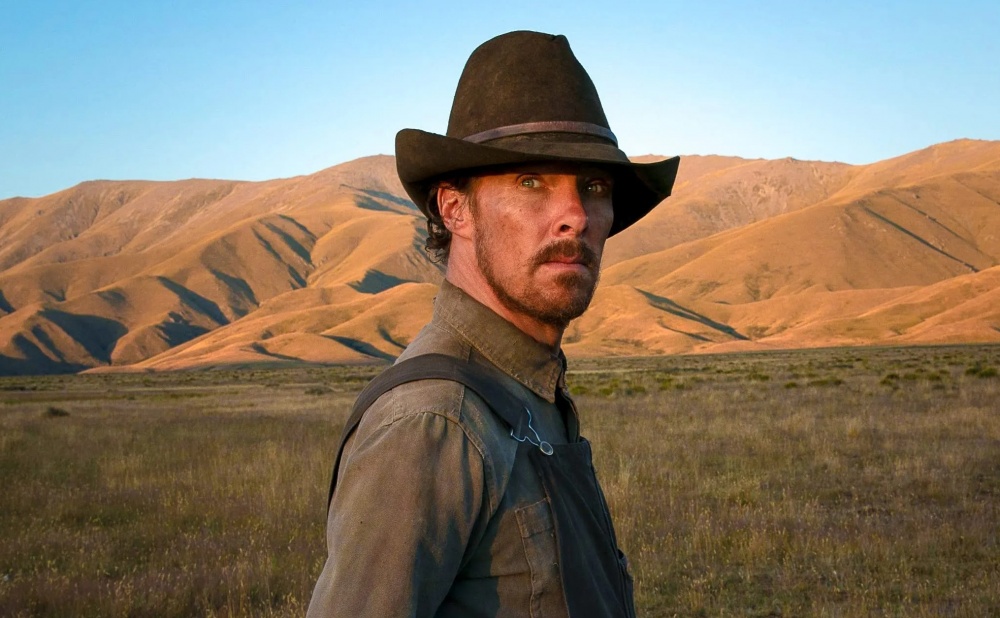
Jane Campion’s film The Power of the Dog scooped up the Best Film and Best Director gongs at the BAFTA 2022 awards on Sunday (13 March).
The film was up against some very strong contenders which included Kenneth Branagh’s Belfast and Denis Villeneuve’s Dune but Campion’s psychological film walked away with the top prizes.
Director Jane Campion, who won an Oscar in 1994 for Best Original Screenplay for her film The Piano, returns to some of the daring gender and sexuality themes she explored in that film in her latest work.
She takes charge of the reins of a genre – the western – which is often seen as the domain of male directors. Campion shows confidence and complete mastery of the horse opera and her film exudes the prowess and rugged textures associated with guns, horses, men and the untamed landscape of the frontier which form the backbone of western films.
Campion’s fresh and original take on the western is astonishing. This is a western without guns or bullets, or shootouts in dusty sun drenched vistas, yet the film still manages to convey the same ideals by using mouths as guns and words as bullets and the shootouts become loaded arguments at dinner parties hosted inside the dark and cold interiors of family homes.
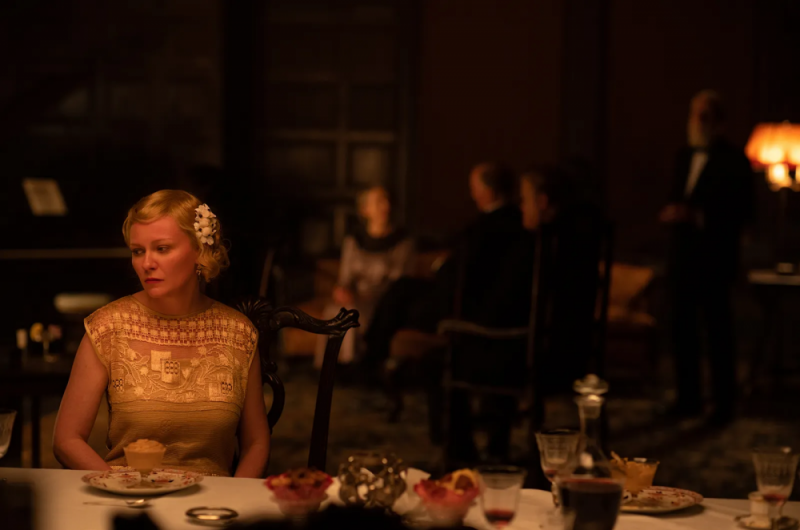 Netflix
Netflix Campion’s mastery is the way she exerts a feminine touch to what initially appears to be a macho story based on a book by Thomas Savage which was published in 1967. The director allows the tale, which is largely populated by male characters, to unfold with a deeper emotional edge which goes beyond the stereotypes associated with manly tales of the Old West.
The film opens in 1925 and the social and physical order of the Old West is fading away. Horses are being replaced by cars, and men are in crisis over their position and role in a rapidly changing society where power and control are shifting. The social and sexual dynamics are in turmoil, and gender politics are causing friction as the world begins to change externally and internally.
Two brothers named Phil and George, who run a wealthy ranch in Montana, have reached a crisis point after 25 years of herding and driving cattle. While soft-spoken and refined George is looking ahead to the future, and dreams of rising up the social ladder and mingle with the power brokers of the world, his brutish and blunt brother Phil continues to look back at the rapidly fading past where men fearlessly explored dangerous frontiers while women were expected to stay at home, raise children, and slave away in the kitchen.
The brothers’ strained relationship comes to a head when George marries Rose, a widow with a teenage son, and decides to settle down rather than continue his life as a wandering cowboy. The callous and crude Phil thinks that Rose is a money grabbing schemer and that her son, named Peter, is effeminate and weak. His outrage and bullying behaviour towards Rose and Peter sets in motion events that reveal the darkness that lurks inside the minds of those who stifle their own dreams and desires.
Benedict Cumberbatch takes on the villainous role of the volatile and simmering Phil, and his performance lingers and burns through the film even when his character is not in a scene. His face is smeared with dust and grime, and his rodent like eyes are as furtive as a scavenging rat while his calloused hands are constantly tarred with the dirt and blood from his daily work on the ranch. He rarely changes his filthy clothes and he sleeps without taking off his muddy riding boots. Cumberbatch’s invests such a realistic feral aspect to Phil that the audience can almost smell the stench reeking off him.
Cumberbatch does not present Phil as a hissing pantomime villain despite visually looking like one. On the exterior he resembles a savage satyr, with his legs always wrapped in protective chaps that resemble the furry legs of a goat, and his metaphoric horns concealed under his tall cowboy hat. The actor reveals the man underneath all the filth and grease. Phil is a complex individual who is nursing a secretive and taboo pain, and his grief is crippling his relationships with those around him.
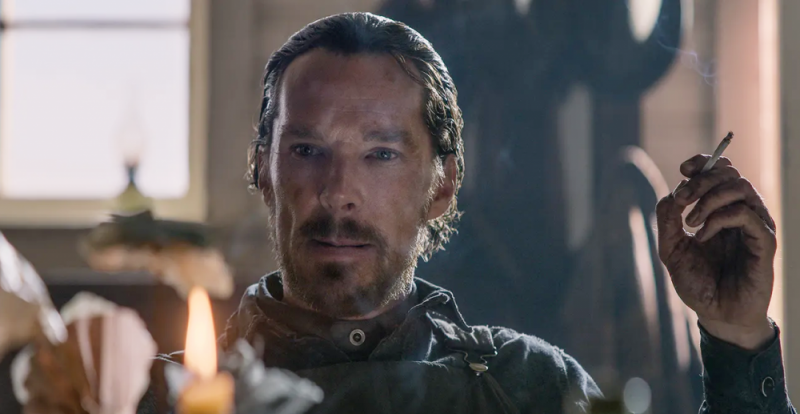 Netflix
Netflix What makes Cumberbatch’s performance so effective is the range of Shakespearian emotions he reveals as his character reacts to the changing world around him. This is a man haunted by envy and jealousy, an Iago whose life has stagnated while others push ahead. He emotes through his voice, through his aggressive walk and gait, and through the way he plays the banjo.
Despite having received a classical education, which included Greek and Latin, Phil rarely applies his learning to the world that he finds himself in. Whereas his voice is often laced with sharp barbs and wrath, his musical instrument reveals a gentler side to his character. The elegiac music that he strums on the strings of the banjo – an instrument that Cumberbatch learned to play – becomes the tongue of his soul. However, as time passes the sweet and melancholic music of the banjo takes on a mocking and jarring tone. The snakelike Phil twists the notes of his instrument until it becomes a symbolic reference to the hate he feels inside his heart. The sound of his banjo becomes the warning rattle of a rattlesnake.
Cumberbatch may have lost the Best Actor gong at last night’s BAFTA awards but he’s still in with a chance of winning an award for his performance at this year’s Oscar ceremony.
The clean cut, suit wearing, and mild mannered George is played by Jesse Plemons. The calm and reassuring qualities of his character act as a contrast to the seething rage that bubbles away inside his brother Phil. Plemons also shares tangible chemistry with his on-screen wife Rose who is played by his real life partner Kirsten Dunst.
Dunst and Plemons are absolutely convincing and their scenes are tender, warm, and filled with emotion. The soul connection is so deep that even when the couple share a scene and there is no dialogue between them there is still a warmth and a sense of a spiritual resonance shared by both of them.
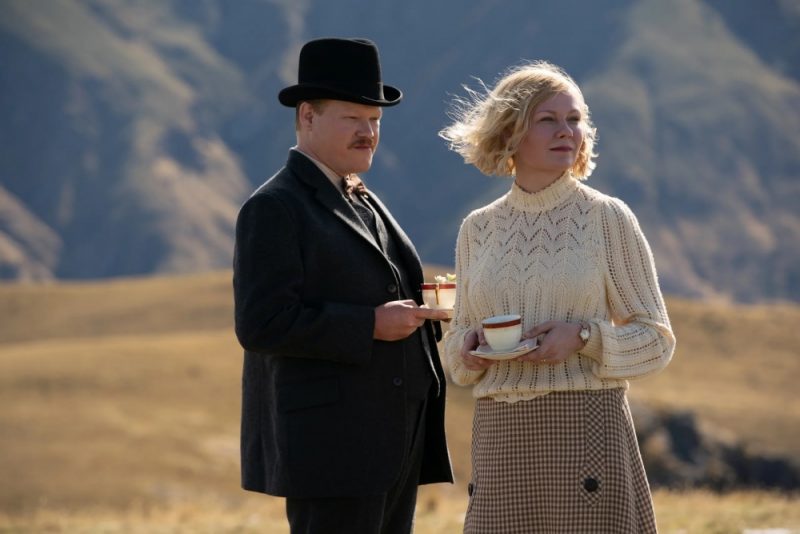 Netflix
Netflix Campion shies away from colour coding the two brothers too starkly. Both characters carry a mix of traits which makes them more human. The more sedate and moderate George also carries darkness and a destructive aspect, albeit in an unwitting manner. His treatment of Rose as a trophy wife is as destructive as the mental cruelty inflicted upon Rose by Phil. Both brothers, in their own differing and contrasting ways, end up harming Rose and driving her to the edge of the abyss.
Dunst displays incredible courage and resilience, a delicate balance between strength and fragility, in a landscape heavily populated with men who lack the social skills to express the true contents of their hearts due to the toxic masculinity of the era.
Kodi Smit-McPhee takes on the role of the mousey and timid Peter whose doe eyes and fragile body seems to infuriate Phil’s Neanderthal views about men and masculinity. Smit-McPhee comes across as a young Anthony Perkins in his infamous role of Norman Bates in Psycho. This young man is all ticks and nerves, more a silent observer than a vocal participant, and moving through life in a shy and awkward manner. Smit-McPhee makes the audience share in his discomfort and agony as his character deals with the constant homophobic bullying at the hands of the merciless Phil and his cronies. Instead of taking bait and retreating into a shell, Peter refuses to stoop to the level of his tormentors. He explores his world in a striking and intimate way by dissecting and examining the organic nature of life itself.
Jane Campion continues the feminine touch to her psychological western drama by employing a woman to shoot her film. Ari Wegner, who is only the second woman in the 94-year history of the Oscars to get a nomination for Best Cinematography (for The Power of the Dog), delivers an incredibly poignant sheen to Campion’s delicately balanced film. The film begins with a nod to what is often thought to be the greatest western ever made – John Ford’s The Searchers.
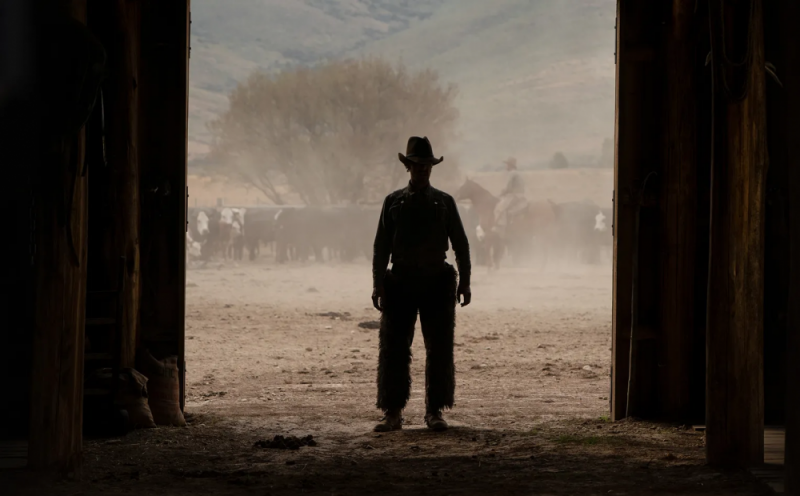 Netflix
Netflix Ford’s legendary film begins with the central character Ethan, played by John Wayne, framed by a doorway that looks out into a world that is changing and with that change comes the change in people. Likewise, in Campion’s film the tale opens with Phil framed by a doorway, and then a series of windows, which look out into a changing landscape where horses are being replaced by the motorcar.
These poetic references are also reflected in the landscapes which Wegner lights with a haunting and sensual glow. The mountain ranges are not photographed as gritty, craggy or fragmented. The hills and valleys in this western are supple and lilting, the valleys flow and weave almost like human skin. The sand and earth have textures that curve and ripple like a living entity.
Wegner applies the same erotic ambiance with the way she photographs the scenes where Phil is sunbathing near a lake. As he plays with the scarf of his childhood hero and mentor there is a shift in his stern and cruel exterior. His hand brushes the soft fabric of the scarf over his face and arms. The scarf caresses and dances over his bare skin, the sunlight seeping through the cloth and painting a golden glow across Phil’s body as he lounges upon a bed of grass in his private Eden. The homoerotic sensuality is captured in a painterly manner by Wegner’s nuanced cinematography.
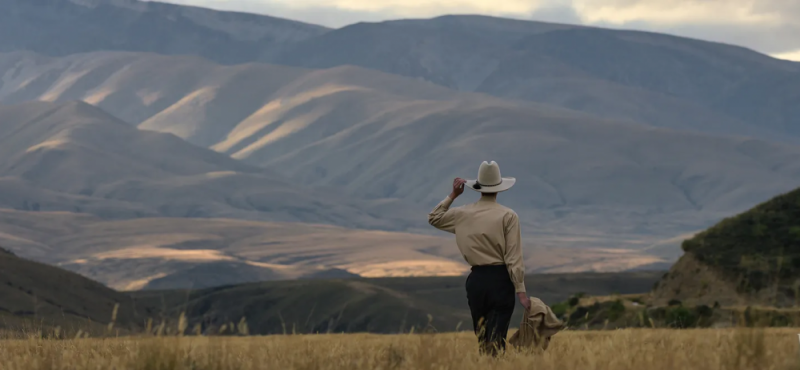 Netflix
Netflix The homoeroticism is symbolised in other ways too including the way the coursed and scarred hands of Phil tenderly and sensually cleans a saddle with a soft cloth. The lighting is almost like an alter scene in a biblical film. The homoerotic atmosphere is also highlighted through the way Phil weaves and knots together rawhide to make a rope. The taut coils of the rope resemble the veins on a phallus, and as he works his hands over the rope Phil’s coiled and tightly knotted emotions battle with his inner desires which he keeps buried deep inside his psyche.
The title of the film is a biblical reference taken from the book of Psalms but another reference from the same source is mined throughout the film for the visuals. The cinematography poetically highlights the biblical line ‘the meek shall inherit the earth’. The visual motifs of the meek inheriting the earth is always close to the surface in the film. Tiny little specks are seen trekking across the landscape and as the camera zooms in closer the specks are revealed to be cattle being herded by cowboys.
In other scenes the visual vocabulary captures tiny insects crawling over the hides of horses and cattle, and in some startling scenes of dead cattle the microscopic details of the metaphorical cinematography reveals small bluebottle flies feeding on the carcass of a cow. A once strong and dominant steer is now fodder for the insignificant little flies that it once used to swat without a thought with a swish of its tail.
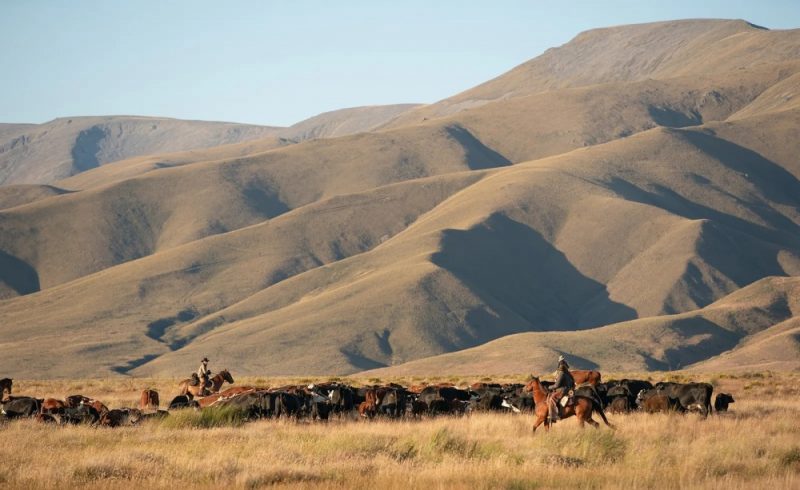 Netflix
Netflix Radiohead’s lead guitarist Jonny Greenwood supplies the discordant, yet lyrical and melodic, soundtrack which sears itself into the film in a beautiful and very subtle manner. Greenwood uses a number of instruments including piano, brass and winds, and generates a mood of unease and suspense. The soundtrack also captures the conflicting emotions of the characters. There is simmering tension beneath the surface layer of the music as characters yearn for release from the shackles of society and morality. Greenwood unleashes a powder keg of emotions as people battle with their forbidden hungers. The low key and gentle music creates an eerie contrast to the anguish, loneliness and alienation being felt by the central characters who are trapped in an unforgiving landscape which cages and suffocates them.
The Power of the Dog is Jane Campion’s first film in 12 years, and there was a time during those years when she contemplated retirement, yet she returns triumphantly in this Netflix and BBC Films gothic melodrama which has garnered awards from film festivals around the world. She is the first woman to be nominated twice for Best Director at the Oscars and hopes are running high for her to finally win the Academy Award this year for her new film.
The sedately paced film deals with mature themes with sensitivity and never tries to pass quick judgement on flawed and complex characters. Campion’s deeply moving film takes the bleak and hostile external landscape of the western and internalises it while presenting the physical landscape as vast, beautiful and hopeful. She makes the audience see reflections of our contemporary world in her visually poetic and courageous film.






